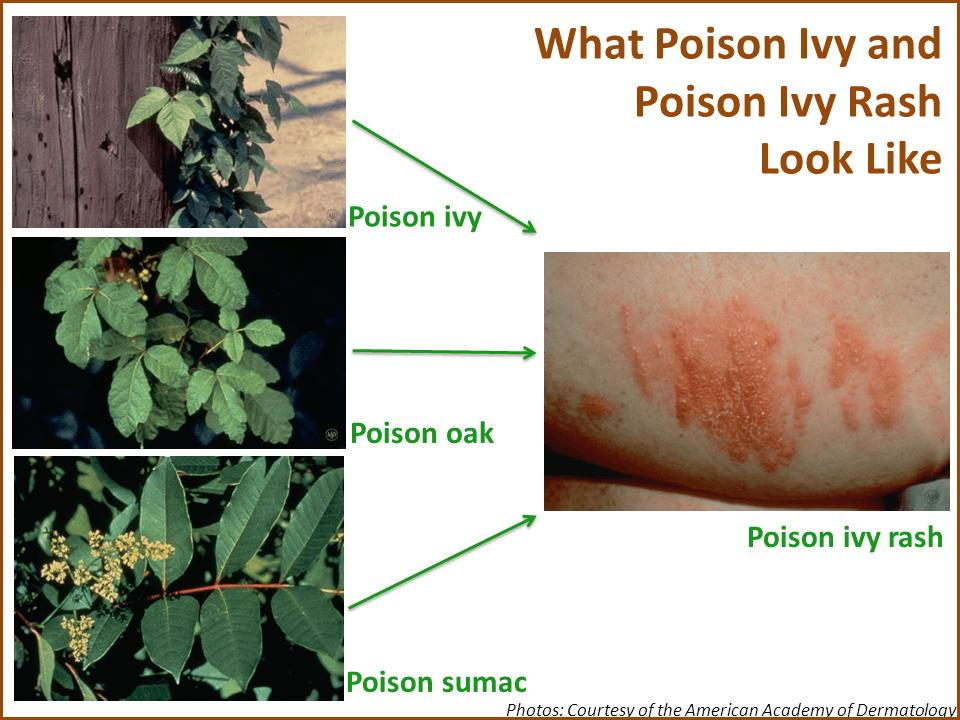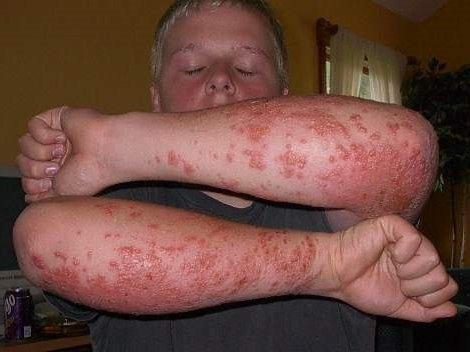Leaves of three, LET IT BE!

Leaves of three, LET IT BE!
- posted: Jun. 30, 2024

Here at Nashville Dermatology Physicians, Dr. Jeffrey Berti and Dr. Toula Berti, often see patients suffering from contact dermatitis caused by exposure to plants. The most common plants to cause rashes are poison ivy, poison oak and poison sumac. The old adage "Leaves of three, let it be" serves as a useful reminder to avoid these plants, but understanding how to prevent and treat the resulting dermatitis is crucial for those who come into contact with them.
Identifying Poison Ivy, Oak and Sumac
- Poison ivy: typically has three leaflets per stem, which can vary in color from green to reddish. The edges of the leaves may be smooth or slightly toothed.
- Poison Oak: resemble oak leaves, they are lobed or scalloped with edges that can be smooth or toothed.
- Poison sumac: has clusters of 7-13 leaflets arranged in pairs along a central stem, with a single leaflet at the tip. These plants thrive in wooded, marshy areas.
Prevention Tips
- Learn to Identify: Familiarize yourself with the appearance of poison ivy and sumac. Apps and field guides can be handy tools.
- Wear Protective Clothing: When hiking or working in areas where these plants grow, wear long sleeves, pants, and gloves.
- Barrier Creams: Apply barrier creams to exposed skin before potential exposure. These creams can provide a protective layer that helps prevent the plant’s oil, urushiol, from penetrating the skin.
- Immediate Washing: If you suspect you've touched poison ivy or sumac, wash the affected area with soap and cold water immediately. Urushiol can bind to the skin within minutes, so quick action is essential.
Treatment Options
- Topical Treatments: For mild cases, over-the-counter hydrocortisone cream can reduce itching and inflammation. Calamine lotion and colloidal oatmeal baths are also effective for soothing irritated skin.
- Oral Medications: In more severe cases, oral antihistamines like diphenhydramine can help alleviate itching. For significant inflammation, a doctor may prescribe oral or IM corticosteroids.
- Avoid Scratching: Scratching can break the skin and lead to secondary infections. Keep nails short and consider wearing gloves at night if itching is severe.
- Cool Compresses: Applying cool, wet compresses to the affected area can provide relief from itching and reduce swelling.
When to Seek Medical Help
If you experience widespread rash, swelling of the face or genitals, difficulty breathing, or signs of infection (such as increased redness, pus, or warmth), seek medical attention immediately.
By understanding how to identify, prevent, and treat poison ivy, oak or sumac dermatitis, you can significantly reduce the risk and impact of this common skin issue. Always remember, "Leaves of three, let it be," and take prompt action, call our office Nashville Dermatology Physicians in Brentwood, Tennessee to see Dr. Jeffrey Berti or Dr. Toula Berti at 615.212.2517.

Leaves of three, LET IT BE!
- posted: Jun. 30, 2024

Here at Nashville Dermatology Physicians, Dr. Jeffrey Berti and Dr. Toula Berti, often see patients suffering from contact dermatitis caused by exposure to plants. The most common plants to cause rashes are poison ivy, poison oak and poison sumac. The old adage "Leaves of three, let it be" serves as a useful reminder to avoid these plants, but understanding how to prevent and treat the resulting dermatitis is crucial for those who come into contact with them.
Identifying Poison Ivy, Oak and Sumac
- Poison ivy: typically has three leaflets per stem, which can vary in color from green to reddish. The edges of the leaves may be smooth or slightly toothed.
- Poison Oak: resemble oak leaves, they are lobed or scalloped with edges that can be smooth or toothed.
- Poison sumac: has clusters of 7-13 leaflets arranged in pairs along a central stem, with a single leaflet at the tip. These plants thrive in wooded, marshy areas.
Prevention Tips
- Learn to Identify: Familiarize yourself with the appearance of poison ivy and sumac. Apps and field guides can be handy tools.
- Wear Protective Clothing: When hiking or working in areas where these plants grow, wear long sleeves, pants, and gloves.
- Barrier Creams: Apply barrier creams to exposed skin before potential exposure. These creams can provide a protective layer that helps prevent the plant’s oil, urushiol, from penetrating the skin.
- Immediate Washing: If you suspect you've touched poison ivy or sumac, wash the affected area with soap and cold water immediately. Urushiol can bind to the skin within minutes, so quick action is essential.
Treatment Options
- Topical Treatments: For mild cases, over-the-counter hydrocortisone cream can reduce itching and inflammation. Calamine lotion and colloidal oatmeal baths are also effective for soothing irritated skin.
- Oral Medications: In more severe cases, oral antihistamines like diphenhydramine can help alleviate itching. For significant inflammation, a doctor may prescribe oral or IM corticosteroids.
- Avoid Scratching: Scratching can break the skin and lead to secondary infections. Keep nails short and consider wearing gloves at night if itching is severe.
- Cool Compresses: Applying cool, wet compresses to the affected area can provide relief from itching and reduce swelling.
When to Seek Medical Help
If you experience widespread rash, swelling of the face or genitals, difficulty breathing, or signs of infection (such as increased redness, pus, or warmth), seek medical attention immediately.
By understanding how to identify, prevent, and treat poison ivy, oak or sumac dermatitis, you can significantly reduce the risk and impact of this common skin issue. Always remember, "Leaves of three, let it be," and take prompt action, call our office Nashville Dermatology Physicians in Brentwood, Tennessee to see Dr. Jeffrey Berti or Dr. Toula Berti at 615.212.2517.
Nashville Dermatology Physicians
1001 Health Park Drive Suite 470,
Brentwood, TN 37027
Monday
7:00 am - 4:00 pm
Tuesday
7:00 am - 4:00 pm
Wednesday
7:00 am - 4:00 pm
Thursday
11:00 am - 6:00 pm
Friday
Closed
Saturday
Closed
Sunday
Closed

